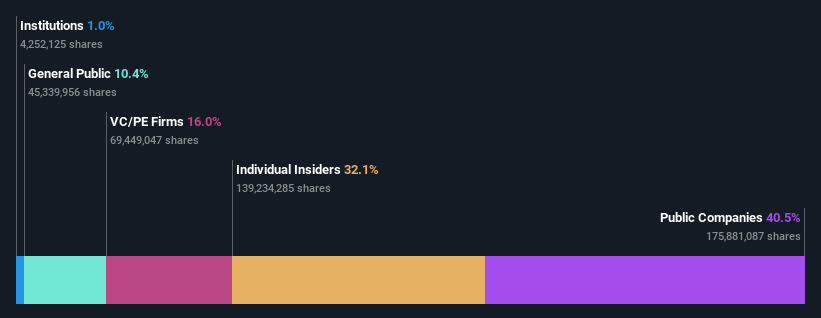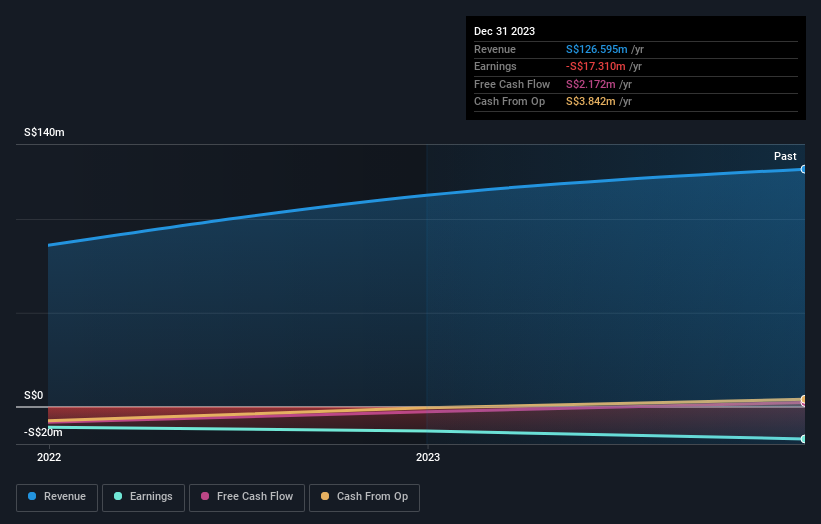Public companies are Synagistics Limited's (HKG:2562) biggest owners and were hit after market cap dropped HK$2.1b

Key Insights
- The considerable ownership by public companies in Synagistics indicates that they collectively have a greater say in management and business strategy
- The top 2 shareholders own 52% of the company
- Insider ownership in Synagistics is 32%
Every investor in Synagistics Limited (HKG:2562) should be aware of the most powerful shareholder groups. With 41% stake, public companies possess the maximum shares in the company. In other words, the group stands to gain the most (or lose the most) from their investment into the company.
While insiders who own 32% came under pressure after market cap dropped to HK$5.3b last week,public companies took the most losses.
Let's take a closer look to see what the different types of shareholders can tell us about Synagistics.
See our latest analysis for Synagistics

What Does The Lack Of Institutional Ownership Tell Us About Synagistics?
We don't tend to see institutional investors holding stock of companies that are very risky, thinly traded, or very small. Though we do sometimes see large companies without institutions on the register, it's not particularly common.
There are multiple explanations for why institutions don't own a stock. The most common is that the company is too small relative to funds under management, so the institution does not bother to look closely at the company. On the other hand, it's always possible that professional investors are avoiding a company because they don't think it's the best place for their money. Synagistics might not have the sort of past performance institutions are looking for, or perhaps they simply have not studied the business closely.

Hedge funds don't have many shares in Synagistics. Looking at our data, we can see that the largest shareholder is Alibaba Group Holding Limited with 34% of shares outstanding. With 18% and 16% of the shares outstanding respectively, Shieh-Peen Lee and Gobi Partners are the second and third largest shareholders. Shieh-Peen Lee, who is the second-largest shareholder, also happens to hold the title of Top Key Executive. In addition, we found that Ho Yan Tai, the CEO has 5.7% of the shares allocated to their name.
To make our study more interesting, we found that the top 2 shareholders have a majority ownership in the company, meaning that they are powerful enough to influence the decisions of the company.
Researching institutional ownership is a good way to gauge and filter a stock's expected performance. The same can be achieved by studying analyst sentiments. Our information suggests that there isn't any analyst coverage of the stock, so it is probably little known.
Insider Ownership Of Synagistics
The definition of an insider can differ slightly between different countries, but members of the board of directors always count. The company management answer to the board and the latter should represent the interests of shareholders. Notably, sometimes top-level managers are on the board themselves.
I generally consider insider ownership to be a good thing. However, on some occasions it makes it more difficult for other shareholders to hold the board accountable for decisions.
It seems insiders own a significant proportion of Synagistics Limited. Insiders own HK$1.7b worth of shares in the HK$5.3b company. We would say this shows alignment with shareholders, but it is worth noting that the company is still quite small; some insiders may have founded the business. You can click here to see if those insiders have been buying or selling.
General Public Ownership
The general public, who are usually individual investors, hold a 10% stake in Synagistics. While this size of ownership may not be enough to sway a policy decision in their favour, they can still make a collective impact on company policies.
Private Equity Ownership
With an ownership of 16%, private equity firms are in a position to play a role in shaping corporate strategy with a focus on value creation. Sometimes we see private equity stick around for the long term, but generally speaking they have a shorter investment horizon and -- as the name suggests -- don't invest in public companies much. After some time they may look to sell and redeploy capital elsewhere.
Public Company Ownership
Public companies currently own 41% of Synagistics stock. It's hard to say for sure but this suggests they have entwined business interests. This might be a strategic stake, so it's worth watching this space for changes in ownership.
Next Steps:
While it is well worth considering the different groups that own a company, there are other factors that are even more important. To that end, you should be aware of the 1 warning sign we've spotted with Synagistics .
Of course this may not be the best stock to buy. Therefore, you may wish to see our free collection of interesting prospects boasting favorable financials.
NB: Figures in this article are calculated using data from the last twelve months, which refer to the 12-month period ending on the last date of the month the financial statement is dated. This may not be consistent with full year annual report figures.
New: Manage All Your Stock Portfolios in One Place
We've created the ultimate portfolio companion for stock investors, and it's free.
• Connect an unlimited number of Portfolios and see your total in one currency
• Be alerted to new Warning Signs or Risks via email or mobile
• Track the Fair Value of your stocks
Have feedback on this article? Concerned about the content? Get in touch with us directly. Alternatively, email editorial-team (at) simplywallst.com.
This article by Simply Wall St is general in nature. We provide commentary based on historical data and analyst forecasts only using an unbiased methodology and our articles are not intended to be financial advice. It does not constitute a recommendation to buy or sell any stock, and does not take account of your objectives, or your financial situation. We aim to bring you long-term focused analysis driven by fundamental data. Note that our analysis may not factor in the latest price-sensitive company announcements or qualitative material. Simply Wall St has no position in any stocks mentioned.
About SEHK:2562
Synagistics
Provides data-driven digital solutions platform in Southeast Asia.
Imperfect balance sheet very low.
Market Insights
Community Narratives




